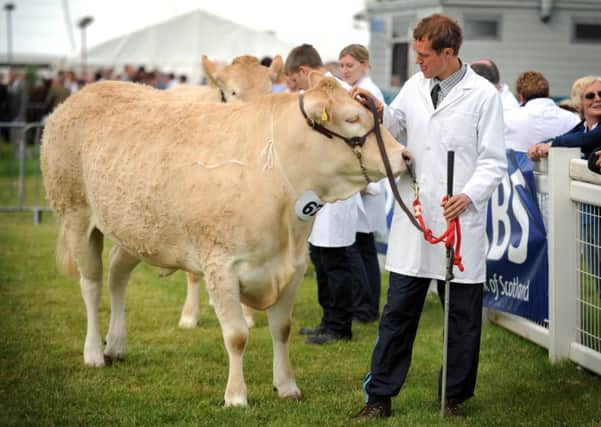Royal Highland Show: Yes, No campaign at Ingliston


Yes and No tents pitched at Ingliston, near Edinburgh, which is estimated to see some 170,000 visitors over the four day run.
Advertisement
Hide AdAdvertisement
Hide AdThe focus was firmly on rural voters, farmers and agricultural firms and saw speeches by the UK rural affairs minister and Scotland’s first minister.
Many farmers and business owners at the event said they were undecided.
Some said they feared temporarily losing subsidies if Scotland left the UK and faced a wait to enter the European Union.
But others said regulations laid out by the UK’s Department for Environment, Food and Rural Affairs (DEFRA) were holding Scotland back when it came to selling goods such as meat abroad.
Owen Paterson, the UK minister for rural affairs, said farmers and growers in an independent Scotland would lose out on the export market.
Staying within the UK offers the nation a “massive advantage” and the “best of both worlds”.
He claimed opening up lucrative markets in China, Russia, Turkey and Nigeria could only be done using the UK’s enormous diplomatic network, which would be off limits after a Yes vote.
The UK has 267 embassies and high commissions around the world, which he said were key to negotiations with foreign leaders.
“It’s a hell of a risk to throw that away,” he said.
Advertisement
Hide AdAdvertisement
Hide AdThe First Minister countered by highlighting Scotland’s position at the bottom of the league table of EU subsidies and claiming that independence would have seen rural businesses secure an extra E3.5 billion in EU subsidies under the Common Agricultural Policy and rural development funding
Alex Salmond said: “It is incomprehensible that Scotland is losing out, and by Scotland I don’t mean the Scottish Government. It is our farmers, crofters and rural communities – the stewards of natural Scotland.
“It is our rural businesses, the agricultural supply chain, families and communities who are missing out on billions of pounds because we have no direct representation in Europe and are represented by UK governments which consistently fail to secure a fair deal for Scotland.”
He said this amount of cash could support an extra 5,500 jobs and generate £1.7 billion for the economy over by 2020.
He added: “As an independent country, this level of rural development funding would have been in Scotland’s reach along with an additional €1 billion in direct farm payments.
“Independence will give Scotland a direct voice in Europe for the next round of CAP negotiations, and the ability to secure the best possible deal for our farmers, crofters and rural communities.”
Scott Henderson, chair of the Scottish Beef Association, said politics had its place at the four-day show, the biggest event of its kind north of the Border, and that voters needed to hear both sides of the arguments to make an informed decision.
“It’s an issue that’s crucially important to Scotland. There’s no escape from it at the moment,” he said.
Advertisement
Hide AdAdvertisement
Hide AdFrom speaking to association members across the country, he said it seemed most remain unsure which way they will vote in three months’ time.
“Your heart tells you one thing and your head tells you another. That’s the quandary I’m in,” he said.
He also pointed out that the UK government’s claims that they hold the key to increasing Scottish exports are flawed, saying regulations laid out by DEFRA actually hamper selling meat abroad.
But he said beef farmers fear independence might cut off Scotland’s biggest market - which is south of the border.
“Our biggest customer in Scotland is England and we can’t afford to turn our backs on that.
“Exporting to third countries is something for the future. In the next year or so, England is our crucial market.”
Iain Fullerton, 61, an arable farmer from Kelso in the Scottish Borders, said he was unsure, but was perhaps leaning towards a No on 18 September.
He said support seemed to be split depending on where farmers were based, with support for staying part of the UK strengthening the closer they got to the border.
Advertisement
Hide AdAdvertisement
Hide Ad“My farm’s right on the border, so I do a lot of business on both sides,” he said.
“I’m not against Yes, but I’m more inclined towards staying in the UK at the moment.”
His main concerns were over Scotland’s position in the European Union and whether subsidies would dry up with independence.
“I’m not convinced we’ll get quick entry back into Europe if we become independent. I reckon it would take four or five years. We couldn’t farm without subsidies, we would be bankrupt.”
He added that is was “vital” that both campaigns have a presence at Scotland’s key showcase for rural businesses “so we can decide on the day”.
Robin Orr, a breeder of Aberdeen Angus cattle and Texel sheep based in Dunfermline, said a Yes vote would be good for farmers - but the opposite for Scots in general.
“We’ve got to stay together. The UK government has kicked Scotland in the teeth a few times agriculture-wise but it’s not just about agriculture.
“It’s about industry, the health service, the currency, pensions. If there’s a yes vote I will certainly take my money out of Scotland.”
Advertisement
Hide AdAdvertisement
Hide AdIrishman John Parsons, of Cow Comfort cattle farming supplies, has been visiting the show from his Lancashire base for 20 years.
He said Scots might be ill-advised to place their hopes on European subsidies after independence as agricultural policies have made farming unsustainable in many parts of Ireland, particularly in the west, where he comes from.
He said: “The general feeling in Ireland is that Europe has not been a good thing for farming.
“I don’t think Scotland should hang its colours to the mast on that one.”
SEE ALSO